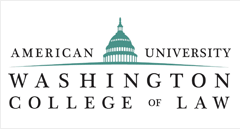About This Journal
The Labor & Employment Law Forum is edited and published on a quarterly basis by its staff at the American University Washington College of Law ("WCL").
Articles published by the Forum reflect the views of the individual author(s) and do not necessarily represent the views of the Forum or the Washington College of Law.
Mission
The mission of the Labor & Employment Law Forum is to provide a specific and neutral forum for students, scholars, practitioners and organizations to explore the complex developments of the law governing the workplace.
The Forum shall serve as a medium that highlights emerging developments in labor and employment law and explores the legal issues that arise under this area of law.
Purpose
"At the turn of the century women earned approximately ten cents an hour, and men were fortunate to receive twenty cents an hour. The average work week was sixty to seventy hours. During the thirties, wages were a secondary issue; to have a job at all was the difference between the agony of starvation and a flicker of life. The nation, now so vigorous, reeled and tottered almost to total collapse. The labor movement was the principal force that transformed misery and despair into hope and progress. Out of its bold struggles, economic and social reform gave birth to unemployment insurance, old age pensions, government relief for the destitute, and above all new wage levels that meant not mere survival, but a tolerable life. The captains of industry did not lead this transformation; they resisted it until they were overcome. When in the thirties the wave of union organization crested over our nation, it carried to secure shores not only itself but the whole society." - Dr. Martin Luther King, Jr.
Labor and employment law is an area of law that impacts every single individual in this country, if not all around the world. It addresses some of the most important and fundamental issues of law—as exemplified by its coverage in most, if not all of foundational law school courses. Labor and employment remains the second-most litigated topic in the Federal Courts.
Washington, D.C. is the home of the United States Supreme Court, the United States Court of Appeals for both the D.C. and Federal Circuits, the Department of Labor, the National Labor Relations Board, the Equal Employment Opportunity Commission, the Merit Systems Protection Board, most—if not all—of the unions in this country, and the Chamber of Commerce.
Yet, as of April, 2010, there were only five student-run legal publications that specifically focus on labor and employment law, nationwide and none of these publications were located in Washington, D.C. The students of the WCL sought to supplement this area of the law by founding the sixth student-run, legal publication in this area – The Labor and Employment Law Forum.
The Washington College of Law has long demonstrated a commitment to the importance of labor and employment law. Founded in 1896 by Ellen Spencer Mussey and Emma Gillett, the Washington College of Law was created for the sole purpose of providing opportunities for individuals historically outside the mainstream of the legal profession. WCL has a long-standing tradition of educating students about the values of dignity, diversity, and equal rights for all. In addition, the school has a reputation for being one of the preeminent institutions in the United States for its programs on international law, human rights, business law, and law and government. Because of WCL’s focus on these areas of the law, it is no surprise that the school boasts over fifteen professors teaching approximately two dozen courses and seminars focused on the various aspects of labor and employment law. Furthermore, WCL is one of the few LL.M. degree programs in the nation that offers a specialization in Labor and Employment Law & Policy within the Program of Law and Government’s Master of Laws. The Labor and Employment Law Forum offers a way to supplement and focus all of these related academic elements, already present at WCL.
The Forum is a novel publication at WCL, serving as an experiment for the future of legal publications. Early on, the decision was made to partner with Digital Commons and provide a forum for thought-provoking, legal scholarship with an emphasis on shorter, timely works and a fast publication deadline. The Digital Commons gives us, and we hope our readers, the ability to access polished articles in the native format that most legal scholarship is currently being read – electronically. The Forum has struck the balance between the quality of editing synonymous with traditional, scholarly legal publications and the necessity for rapidly completing the publication process for these timely articles.
